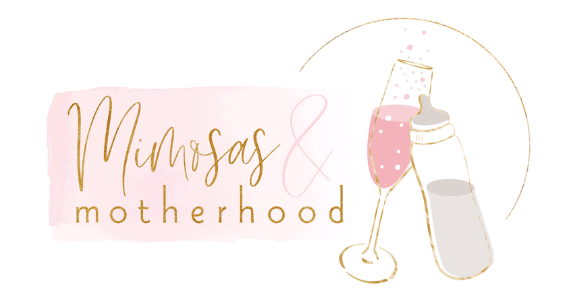Breastfeeding Tips for First Time Moms
As a mama of a now two toddlers, those first month home with both of them already feels like a lifetime ago. When I think back to that time, there are so many things I wish I could go back and tell myself, especially when it came to breastfeeding. Here are my biggest breastfeeding tips for first time moms.

Those first few weeks how with your new baby are magical. There are so many things I look back at and wish that I could tell myself: that the days really do fly by; to savor those teeny fresh newborn snuggles as much as you can (even when all you can think about is how much you miss regular sleep); that the first time your baby says “mama” will be so much better than you could have ever imagined, and so much more.
By far one of the biggest things I would tell myself in those first few weeks would be about breastfeeding tips and what I wish I would have known about breastfeeding tips as a first-time mom.
I originally wrote this post for new moms when I was a new mom myself! Our oldest was just 7 months old, and I remember wishing I had had more information about so many things, like milk ducts, what a good latch is, wet diapers, how to choose a breast pump, growth spurts and more.
Note: Some links may be affiliate links. That means I may make a commission if you use my links to purchase, at no extra added cost to you! I only recommend products that I personally love and believe in. Full disclaimer here.

Breastfeeding Tips for First-Time Moms
Breastfeeding is HARD, you guys. I don’t think I was nearly as prepared as I should have been for just how challenging it was not only for me, but also for every single one of my first-time mama friends.
I had an idea in my head that breastfeeding was natural, and that my body would immediately know what to do, but the truth was it didn’t happen like that. I shed so many tears trying to breastfeed with my first child, and at times felt very alone in this struggle.
If you’ve come across this post because you are struggling with breastfeeding, I want you to know that you are NOT alone. Did you know that according to researchers to UC Davis, 92% of new mothers report problems breastfeeding? NINETY-TWO PERCENT!
Half of the mothers reported problems with getting the baby to latch on to the breast (or other feeding issues, like nipple confusion); nearly half said pain was a problem for them; and nearly half again also reported that they just weren’t producing enough milk.
I remember feeling like such a mom failure in my breastfeeding struggles. It was so hard to see that not only was I not alone, but that nearly all first-time mamas struggle too!
The Benefits of Breastfeeding
Breastfeeding can be tough, but there’s a reason so many people talk about the benefits of it, like:
- It helps reduce post-delivery bleeding and helps your uterus return to its pre-pregnancy size
- You burn up to 500 extra calories a day nursing, which means it can help you shed those pregnancy pounds faster.
- It can delay the return of your period (but be sure you still use some form of birth control when you begin having intercourse again!)
- Not having to buy formula means it saves money
Common Breastfeeding Challenges New Moms Face
First: there are a dozen reasons why breastfeeding might not be working for you, and I want to preface this that I am NOT a breastfeeding expert. However, there are some common breastfeeding-related issues that most new moms face, and how you can try to avoid them.
Cracked and sore nipples: This is super common! A major cause of sore and cracked nipples is a poor latch. Check the position of baby when he latches on, and be sure to smooth a small amount of lanolin or coconut oil over your nipples after each nursing session. Alternate which breast you feed from, and try limit nursing to 5 to 10 minutes on each side until your nipples improve.
If you are still having issues, consult a board-certified lactation consultant (more details below). Many of these consultants are covered by health insurance and can help with everything from a proper latch to learning your baby’s needs to how to make enough breast milk and more.
Engorgement and clogged milk ducts: Engorgement is when your breasts are way too full. If you experience this, try pumping or hand expressing in between feeding. Warm water from a shower can also help.
There are a few different techniques for unclogging a blocked milk duct at home that really work! Here are two great ones:
How to Clear a Clogged Milk Duct with a Haakaa
How to Use Vibration, Like an Electric Toothbrush for a Clogged Milk Duct
Mastitis: If one of your breasts feels hot, sore and looks red, or you feel like you have symptoms of the flu, you might have mastitis. This is a breast infection that will need antibiotics, so be sure to contact your healthcare provider right away.
Thrush: Thrush is a common fungal infection that can develop on the breast and be passed to your baby’s mouth. Both you and baby will need to be treated if you develop this. To help prevent thrush, be sure you let your nipples air dry after feeding/pumping, wear a clean bra every day and try to reduce yeasty products and sugar in your diet.

Tips for Breastfeeding Success
Breastfeeding looks different for every new mom, but there are some tips that help most breastfeeding moms in general.
First, try to breastfeed within the first hour of birth. If possible, have a nurse or lactation consultant check on baby’s latch while you’re doing this. It will feel uncomfortable but shouldn’t be painful! If it DOES feel painful, be sure to let them know so you can try a different position.
Be aware that your milk most likely won’t come in the first day. Prepare for you milk to come in around the third of fourth day after birth. Trust me, you’ll know when this happens because your breasts will suddenly look and feel gigantic!
A good schedule is to plan to breastfeed on average eight to twelve times in a 24-hour period. Newborn babies nurse more than you expect! Learn the early signs of hunger your baby is making, like rooting around searching for your nipple, looking very alert, putting his hand in his mouth or even making little fishy lips (which is what my boys did).
Feed on demand while they are a newborn, and try not to introduce a bottle or any other nipple (including pacifiers) until you feel confident with breastfeeding. If you are struggling to feed baby ask for help! Learn more about Bottle Feeding a Breastfed Baby here.
Stay hydrated! You will want to drink as much water as you did while pregnant, if not more. The more hydrated your body is, the easier it is for it to make more milk! It’s a good habit to drink a glass of water while you are breastfeeding or pumping.

My Top Tips for Breastfeeding as a New Mom
When it came to breastfeeding, I truly struggled with my first child. I felt incredibly lost and felt like a failure. We ended up having to end our breastfeeding journey much earlier than I had wanted because we struggled so much (from low production to repeated clogged ducts, lip ties and infected nipples).
I’m happy to report that I had MUCH more success with my second baby! So, if I could go back in time, these are the things I wish I would have known about breastfeeding as a first time mom.
Work With a Breastfeeding Expert
Again, there are multiple reasons why breastfeeding might not be working for you, and I want to preface this that I am NOT a breastfeeding expert. If you are continuing to have trouble within the first 24 hours after arriving home, you should reach out to your health care provider or a board-certified lactation consultant (find one near you by visiting HERE). These professionals are invaluable assets to breastfeeding families, and can provide resources and information on:
- Basic position and latch of your baby
- Preventing and managing common concerns such as poor latch, inadequate milk transfer or supply, nipple or breast pain, and calming a fussy baby
- Milk expression and storage (including help with pumping challenges)
- Strategies for breastfeeding and lactation after returning to work
- Breastfeeding and lactation in challenging situations, such as feeding twins or triplets, a premature or sick infant, or babies in special medical situations.
I remember being so convinced that I could make breastfeeding work on my own that by the time we DID see a lactation consultant baby A was nearly a week old, and I was completely zapped mentally, emotionally and physically.
Working with an IBCLC completely changed my breastfeeding journey. Lactation consultants are trained to help moms just like you, and many times their services are covered by your health insurance!
It’s ok to ask for help. These incredible professionals want to help you succeed! Find a board-certified lactation consultant near you by visiting the International Lactation Consultant Association here.
Sign up for a breastfeeding course

Your OBGYN or midwife will be able to point you to some in person options, but if you are looking for something you can do from the comfort of your own home, I highly recommend Balanced Breastfeeding Course.
This simple step-by-step program covers everything you need to know. There are 40 videos totaling almost 300 minutes of go at your own pace instruction, plus downloadable PDFs and photos to help illustrate and reinforce what you’re learning.
The course covers SO MUCH valuable information and important breastfeeding tips, including all of the basics you need when it comes to latching and breastfeeding, but also dives into pumping, breast and nipple pain, the anatomy of breastmilk and breast tissue, and how to navigate hurdles that might pop up for you on your breastfeeding journey.
The Balanced Breastfeeding Course.is phenomenal, and I learned so many really valuable tips from it. You can save 20% on the Balanced Breastfeeding Course with code MIMOSAS!
Related: The Best Pacifiers for Breastfed Babies

Recognize both you AND baby are learning
The first time a new mom breastfeeds, there are two people trying to get the hang of what’s happening: both the mom AND the baby. This was something that was hard for me to realize could take a little time. While all babies are born with a suckling instinct, that doesn’t mean your little one is going to get the perfect latch from the very beginning.
Recognize that you are both learning, and that struggling to get the hang of breastfeeding is totally normal for both of you. Be patient with your baby, and with yourself.
Put baby on the boob as much as possible
Put baby on the boob early and often (especially that first week), even if you’re having challenges with breastfeeding. And while you might have been told that you should nurse every three to four hours, that doesn’t mean these are the ONLY times you should put your baby to your breast!
Frequent feedings help to create a great milk supply, and even if you’re exclusively pumping right now and feeding your little one with a bottle, each time you put him to your breast is not only great practice for both of you, but it’s also helping to stimulate that milk production. That skin to skin time will help both of you feel good, too.
Also: don’t wait until for a crying baby to breastfeed. Watch for clues (like rooting, sucking his fingers, moving his lips, etc) and put him to the boob.
If you choose to stop breastfeeding, it’s ok!
Everyone’s breastfeeding journey looks different, and there is nothing wrong with that. You are not a failure if you decide to stop breastfeeding.
I struggled so much with getting my first child to latch correctly. I felt useless as a mom and like I was doing something wrong because it was so hard to consistently feed him from my breasts.
For me, feeding became so much easier and felt so much more stress-free when I moved to exclusively pumping. I was finally able to know that he was getting enough to eat (because I could see how much he was eating from his bottle). I was able to stop stressing about the process of keeping him on my breast, and focus more on being in the moment and bonding with my little guy.
If you are planning to exclusively pump, Milkology also has two fantastic classes on pumping that are just $19 and $14! Check out the Online Exclusive Pumping Class here, and the Pump It Up! class (to help maximize your pumping production) here.
My breastfeeding journey came to an end sooner than I had planned with my first baby because I just plain wasn’t making enough milk from pumping. I wish I would have known there were classes around pumping back then! This is one of the most valuable breastfeeding tips I could have used back then. I remember feeling like such a failure, and feeling this enormous amount of guilt over not being able to “feed” my baby.
But you know what? There is NOTHING wrong with formula. The most important thing is that your baby is happy, healthy and loved, and part of that for many mothers involves introducing formula. So if that’s the path that your journey takes, remember: you are AMAZING. Breastfeeding does not define your value as a mother!
Related Breastfeeding Posts:
How to Clear a Clogged Milk Duct with a Haakaa
How to Use Vibration, Like an Electric Toothbrush for a Clogged Milk Duct
The Best Breastfeeding Accessories
Get the right breastfeeding accessories
Sometimes a great bra makes a huge difference in how you feel! There are SO many options out there to make you feel just as cute and supported when you make the transition to nursing bras. One of my personal favorites was the Kindred Bravely French Terry Racerback Nursing Bra because it was SO comfortable.
It includes a really easy one-handed access to the cups, which fold down for skin to skin contact AND is the only nursing bra brand I’ve found that can accommodate your changing band size during breastfeeding. Plus, it comes in more than 15 colors, and is a cult favorite among moms with its under $30 price tag (check out the nearly 6,000 positive reviews!)
Click HERE to snag your own Kindred Bravely French Terry Racerback Bra
Be sure to also read The Best Breastfeeding Accessories to help you make sure you have everything you need for success.
Final Thoughts on Breastfeeding Tips for First Time Moms
I hope this list of breastfeeding tips has given you hope on your breastfeeding journey. Remember that it’s ok to ask for help, and that there are amazing resources out there for you. Find support from friends, family, you baby’s doctor or your local La Leche League International.
You are not alone!








I had no clue online courses existed for breastfeeding! Thank you so much for posting this. I’ve been feeling really lost and this helped a lot.
I’m so glad I could help!